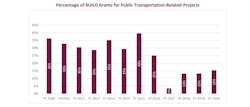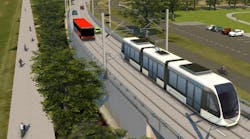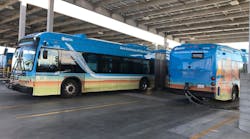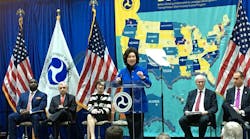APTA urges USDOT to support transit applications for RAISE grants
The American Public Transportation Association (APTA) is urging the U.S. Department of Transportation (USDOT) to refocus one of its most competitive grant programs back to its intended focus: Providing funding to critical multimodal capital investments.
In FY21, USDOT has $1 billion available in Rebuilding American Infrastructure with Sustainability and Equity (RAISE) grants, which originated as TIGER grants under the Obama Administration before being rebranded as BUILD grants under the Trump Administration.
APTA has published a policy paper outlining the decline in transit-related projects awarded funds from this program and makes the case for why a greater percentage of public transit RAISE grant recipients can support the current administration’s transportation priorities.
APTA notes the previous iterations of the grants have been awarded to projects that “not only help enhance mobility but also can result in positive safety, environmental, equity and economic benefits.”
The policy paper states, “From FY 2009 to FY 2016, the percentage of BUILD grants awarded to public transportation-related projects was 33 percent. Conversely, over the past four years, the percentage of BUILD grants awarded to public transportation projects was less than 13 percent.”
APTA notes the shifting priorities of the program not only resulted in transit making up a lower percentage of awarded projects but delivered significant increases to other modes. The paper highlights highway projects, which historically received an average of 35 percent of annual grant funds, but in FY20 (the most recent grant cycle), highway projects received 73 percent of the awarded funding.
In concluding its policy paper, APTA connects the priorities of the evaluation criteria of the open round of grants with the measurable benefits of transit projects.
USDOT will evaluate projects based on safety, environmental sustainability, quality of life, economic competitiveness, state of good repair, innovation and partnership. Additionally, USDOT said it would prioritize projects that “demonstrate improvements to racial equity, reduce impacts of climate change and create good-paying jobs.”
In a letter to U.S. Secretary of Transportation Pete Buttigieg, APTA President and CEO Paul Skoutelas pointed out the overlap in priorities as a strong reason why transit projects should see a higher percentage of RAISE grants awarded.
“We know that every $1 invested in public transportation generates $5 in economic returns and every $1 billion invested in public transportation creates and supports approximately 50,000 jobs. In addition, a typical trip on public transit emits 55 percent fewer greenhouse gas emissions than driving or ridehaling alone. Finally, public transportation provides access to opportunities, including jobs, health care and education,” wrote Skoutelas. “Given the synergy of these priorities and public transportation, we are confident that projects that support critical public transportation initiatives will rate very highly under RAISE grant criteria and we urge full consideration of those project applications.”

Mischa Wanek-Libman | Group Editorial Director
Mischa Wanek-Libman is director of communications with Transdev North America. She has more than 20 years of experience working in the transportation industry covering construction projects, engineering challenges, transit and rail operations and best practices.
Wanek-Libman has held top editorial positions at freight rail and public transportation business-to-business publications including as editor-in-chief and editorial director of Mass Transit from 2018-2024. She has been recognized for editorial excellence through her individual work, as well as for collaborative content.
She is an active member of the American Public Transportation Association's Marketing and Communications Committee and served 14 years as a Board Observer on the National Railroad Construction and Maintenance Association (NRC) Board of Directors.
She is a graduate of Drake University in Des Moines, Iowa, where she earned a Bachelor of Arts degree in Journalism and Mass Communication.






